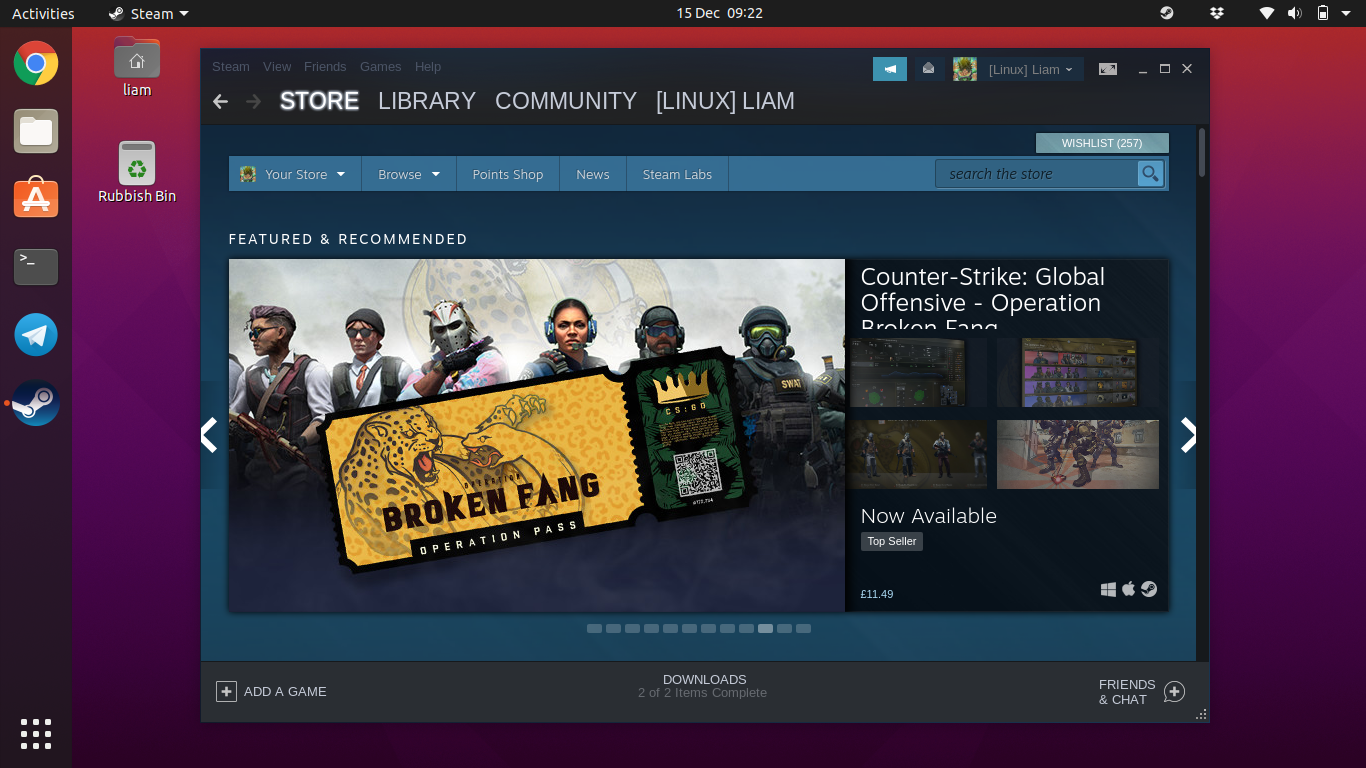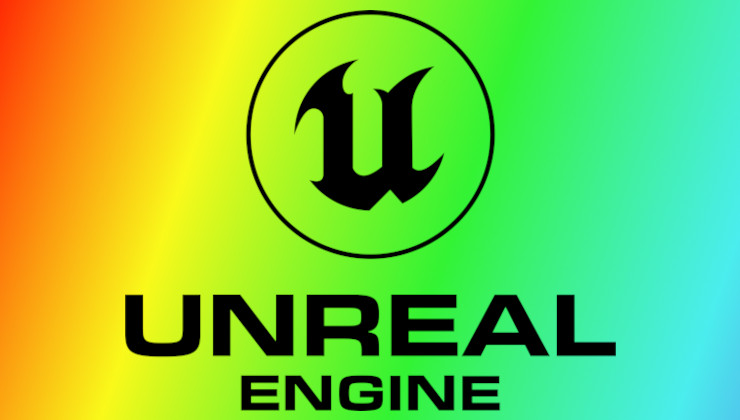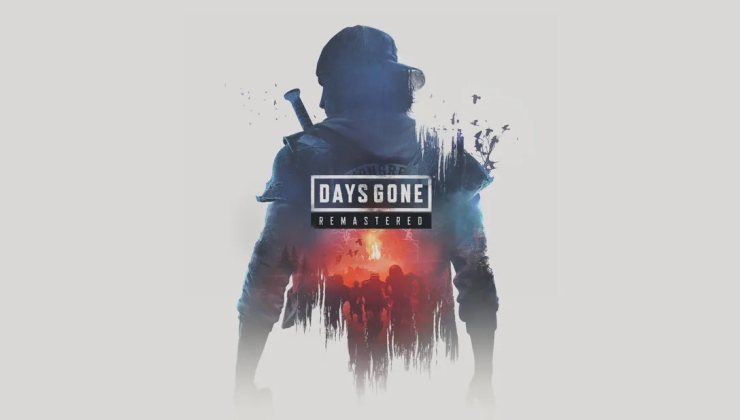For newer Linux users or people looking to switch, it can be a minefield to try and find accurate and up to date info on what Linux distro to game with. Here to help. What is the best Linux distribution for gaming? It's actually not a tough question.
With how far Linux has come in only the last 2 years, you can play a seriously large amount of games now. Sadly, there's some (quite a lot actually) places out there that seem to slap a new date on old crusty articles and give really bad Linux gaming advice. Most of the people writing these types of articles elsewhere clearly don't use Linux - I do, and I have done for around 15 years now.
Let's start off with what not to do shall we? First off, don't bother with SteamOS from Valve. Currently, it's out of date and has been for some time now. It hasn't been properly updated since 2019! Valve are not working on it but they might return one day. Anyone suggesting it likely has no idea what they're talking about and any website listing it is junk.
Next: Ubuntu GamePack or any "specialized" Linux gaming distribution. You can throw almost all of those types in the trash. They really don't do anything normal Linux distributions don't do already and they can often introduce their own special bugs. I consider them like the old discs you would find in the bargain bin in a local PC store. You really don't need them, don't waste your precious time.
So what to actually install at the end of 2020 and in 2021 to game on Linux?
The answer is actually really simple, it's not a long list and you have two really easy choices: Ubuntu or Pop!_OS. With their LTS versions (Long Term Support), you can use them as a safe bet for years.
 Pictured - Ubuntu 20.04 running Steam on my laptop.
Pictured - Ubuntu 20.04 running Steam on my laptop.
Why those? Well, Ubuntu is almost always the most widely used Linux distribution by normal desktop users. On Steam, it has always been on top as the most used distribution by gamers - there's an obvious reason for that too — it works. It's what I always recommend to newer users because it's like a warm cuddly Linux blanket. It's easy to find answers for, and it's not complicated to use. As for Pop!_OS, it's based on Ubuntu and since System76 sell desktop Linux hardware with it you can be sure it's also well tested.
If you do want a specialized distribution, perhaps for a console like experience that SteamOS was supposed to offer then take a look at ChimeraOS. It offers up a good big-screen experience for Steam.
Apart from that, everything you need can be easily installed directly on Ubuntu. Steam for the biggest library of Linux compatible games and for the Steam Play Proton compatibility layer for playing Windows games on Linux, Minigalaxy for GOG games, RetroArch for emulation, itch.io has their own client too for lots of indie gems and the Lutris game manager for everything else. It's really easy to get going too, on Ubuntu you just need to open up Ubuntu Software and search for Steam and it does it for you.
Don't make it complicated for yourself. I say all this as an Arch Linux user, which is a bit of a long-running joke about you always knowing who an Arch user is as they will tell you - and oops, I just fell into it. I'm saying it for good reason though! I have been through Arch Linux, Manjaro, Fedora and more and I still consider Ubuntu to be the number 1 Linux distribution for getting going quickly especially if you're not too comfortable yet.
Keep in mind that just as macOS and Windows do have plenty of issues, so does Linux. Don't expect perfection, be prepared to learn a bit and do things differently. If you need help, we have plenty of resources available for you. We have: a Forum, a Discord, IRC, Matrix, Telegram. You will find answers across there, with the Forum being the best way because search engines pick up answers from forums and do not from social chats like Discord.
Lastly - have fun and keep on gaming on Linux.
I agree with Liam's recommendations for newer Linux users. Ubuntu is a pretty safe choice.
For the experienced users, though, the choice of OS or DE is more a matter of personal preference.
E.g. I use Ubuntu and EndeavourOS on my main gaming PC, but I also use plenty of other operating systems, like Solus or Fedora, and I wouldn't deem any of them as not gaming-capable. If you keep your drivers up-to-date, you are good to go.
Still, there are always some games that don't run properly on one OS, but work perfectly on some others (e.g. some Total War games). That's the reason why I have two operating systems installed on my gaming PC.
So why would you say Ubuntu is safer choice for new users than Endeavour or Endless OS?
My second distro was Antergos and as a newbie I found it about the same, if not easier (although installing NVIDIA drivers was a pain on it at that time) than Ubuntu. For installing anything I just opened Pamac (AUR enabled) and typed name of the software I needed in search.
About a year and a half ago, I finally killed my Antergos by not installing updates for about half a year, then running full system update including AUR. So I thought, okay, my fault, I knew this could happen, since Antergos is a rolling bleeding edge distro. So I installed Ubuntu 18.04 to see if it gotten any better. I used it only for gaming and yet quite often, even if I wasn't running anything at the moment, the OS just froze over and I had to reboot it with power button. Now I'm running Arch on the same PC and I don't think this ever happened to me again.
So no, from my experience, I would not recommend Ubuntu to anyone, including new users.
Last edited by Rooster on 21 Dec 2020 at 9:26 am UTC
I just can not be silent any more, and I feel the urge to speak up, for all of those who recommend to install something different from Ubuntu/Fedora to a newcomer, what's going on in your heads? Maybe distros don't matter in terms of gaming and some basic things like watching youtube or surfing the web. But could you believe it's more than that? No one would considering to switch to Linux just to play games, because surprise not every game is playable. When an app just double click away like packet tracer for example (Ubuntu/Fedora case), and for Manjaro there is [the need for the guide](https://forum.manjaro.org/t/how-to-get-cisco-packet-tracer-on-manjaro/25506/3). So that's being said how all of you can recommend something to a newcomer to deal with all of that?
I would suggest Debian.
I just can not be silent any more, and I feel the urge to speak up, for all of those who recommend to install something different from Ubuntu/Fedora to a newcomer, what's going on in your heads? Maybe distros don't matter in terms of gaming and some basic things like watching youtube or surfing the web. But could you believe it's more than that? No one would considering to switch to Linux just to play games, because surprise not every game is playable. When an app just double click away like packet tracer for example (Ubuntu/Fedora case), and for Manjaro there is [the need for the guide](https://forum.manjaro.org/t/how-to-get-cisco-packet-tracer-on-manjaro/25506/3). So that's being said how all of you can recommend something to a newcomer to deal with all of that?
I would suggest Debian.
And I want to add even more to all of what I just said. Like person decides "Cheez I've had enough with that stupid Windows crap, I need to find something else", person need MS office, he googles "Linux distros for life", and on every article there is "Manjaro no snaps only joy", he decides "Well ok let it be manjaro", then he/she/whatever googles Manjaro and there are different DE, next google request which DE is better and everyone say "KDE", he/she/whatever thinks oh great looks familiar. Installation complete! Next google search how to run MS office on Linux, and let's say it's crossover, because it's the easiest way. He/She/Whatever installs MS office, and can't figure it out "Why I cant control office windows?", and everyone "You need to make Kwin script, cheers I love my Manjaro KDE it's the best"
Why do I type this?
https://youtu.be/vTC32AQR0O0
I surely hope this page will be well indexed...
Yeah, personally I am using Gentoo, which is for me also right at the sweet spot between stability and usability. The stability of the stable packages is amazing, in my opinion much better than what any Ubuntu release since 2012 offered, while untested packages (~arch) can be enabled on a per-package basis, allowing easy installation of the very latest graphics drivers and such.
However I would certainly NOT recommend Gentoo to a beginning Linux user - it's either for people who want to spin their own distribution based on it (*cough* ChromeOS *cough*), server admins who want 100% control over which version of which library/program is installed, or tech enthusiasts.
I'll add one more use case for Gentoo - its a great distro for learning how all the components of a linux distro fit together. The install process walks you through manually partitioning and formating your disk, compiling your kernel, setting up your fstab, bootloader, networking etc. And that just gets you to a VT prompt on boot. Want a gui? Well, you'll go through all the different bits to make that happen - setting up your graphics drivers, X, a display manager, and whatever desktop shell you want to roll with.
Yes, its a ton of work, and it definitely isn't for everyone. But you'll have a vastly better understanding of what's going on under the hood so when you use a distro that does all this for you, you can be better prepared to solve problems that come up.
I'll add one more use case for Gentoo - its a great distro for learning how all the components of a linux distro fit together. The install process walks you through manually partitioning and formating your disk, compiling your kernel, setting up your fstab, bootloader, networking etc. And that just gets you to a VT prompt on boot. Want a gui? Well, you'll go through all the different bits to make that happen - setting up your graphics drivers, X, a display manager, and whatever desktop shell you want to roll with.This is why I loved using it as my main distro for a few years somewhere back in the early 2000s. You know, when installing it was even less streamlined. :P
Yes, its a ton of work, and it definitely isn't for everyone. But you'll have a vastly better understanding of what's going on under the hood so when you use a distro that does all this for you, you can be better prepared to solve problems that come up.
I mean compiling all that stuff with my Athlon Thunderbird 750 took ages, and I had to print out pages and pages of installation manual because I didn't have any other Internet capable devices, but it was all worth it. Portage was and is also a lovely package management system.
Then, when I found other things to occupy my time than tinkering with my system, I moved on to other distros. :)
So why would you say Ubuntu is safer choice for new users than Endeavour or Endless OS?Most of my reasons are actually the same Liam mentioned in this article:
1) There is a lot more info out there to help you solve whatever problem you may face (e.g. AskUbuntu is a great resource that helped me a lot in my early Linux days).
2) Almost everything a beginner level user may need is already in the official repositories.
3) Most of the game developers or porters (Feral Interactive, for instance) ONLY officially support Ubuntu. So, if you have any problem running a game, you can expect to be able to contact them and get a response.
Don't take me wrong: I love EndeavourOS, but I won't recommend it to new users. I showed it to my wife, who has been using Linux for several years now, and she prefers to stick with Linux Mint and Ubuntu.
Ubuntu's a fair choice because it's so widely used, which is great for new users. But they probably aren't going to have support for the absolute latest hardware you might be using, whereas Pop! will. Manjaro is about as good as Pop! for current hardware compatibility, but … I'd still say it's a slightly more advanced choice. I say slightly, because Manjaro is basically Arch but polished for people who more or less just want it to work.
I use Mint, which hews pretty close to Ubuntu LTS (for better and worse), but has their own Cinnamon desktop which will probably feel more friendly to Windows/Mac users. It tends to be a little lighter than Ubuntu with Gnome, but at the expense of the visuals. What Mint has going for it though is the really polished user experience. In places, it's better than Windows/Mac, and the Mint team seem committed to that.
But in the end … it kinda doesn't matter what you use, as long as it's relatively current and you're comfortable with it. I love Debian, but would never recommend it for gaming. But if you're comfortable with it, it has support for your hardware (because your hardware is old or because you're running Debian sid and know how to fix things when they break), it's gonna be a great gaming experience for you in 2021.
Linux gaming is again reaching a point where your distribution just doesn't matter IMO. That's a good thing.
I read nearly all comments up to this point and there were a lot of explanations given, so I don't need to repeat them. I hearted the ones I liked. Whatever distros you may convince your normies to try out, it's on you to help them out.
It has nothing to do with the discussion, do you recommend a PC controller for Linux? I have a Nacon gc 200 wl and it often disconnects by itself, I also have a ps5 controller but it still doesn't work with all Steam games ... help !!!You're right that this is the wrong place for an unrelated question, but [start a new thread in the forums](https://www.gamingonlinux.com/index.php?module=newtopic&forum_id=21) and I'll be happy to give you my recommendation.
What is "naff" naming?[https://www.bbc.co.uk/worldservice/learningenglish/radio/specials/1453_uptodate3/page15.shtml](https://www.bbc.co.uk/worldservice/learningenglish/radio/specials/1453_uptodate3/page15.shtml)
Another source [https://www.urbandictionary.com/define.php?term=naff](https://www.urbandictionary.com/define.php?term=naff) and so on. Pretty common where I am from, I forget that English slang can be an acquired taste. Basically, naff = a bit rubbish.
One of the strangest turn of phrases I've encountered is "it's the dog's bollocks". I still don't know if that's a good thing, or a bad thing.
There is an important piece of information missing regarding Ubuntu: People should imho only use LTS versions. The non-LTS versions are horribly unstable (bordering being completely unusable), and will only lead to frustration.This is not true based on my experience. I update my Kubuntu install every six months when a new version is released and have never had a problem.
About Gentoo and some less common like Mandriva or even weirder package system I should rather not. I have no time even to read about them, less to try them.I used Gentoo many years ago when I had more free time to invest in maintaining my system. Since everything is compiled from source code, the initial install was an all day (and overnight) affair. Even something as simple as installing an office suite could take several hours to download and compile the source code. Of course this was on an older, slower single core CPU, so things may not be as painful these days, but I really didn't mind it at the time until I was in the middle of a college course, and a routine update completely broke my system (not an uncommon occurrence for Gentoo). Since I didn't have the time to recompile an entire Linux install from scratch, I used Kubuntu as a temporary solution to get back up and running quickly and was so pleased with how fast and easy it was that I've never looked back.
About Gentoo and some less common like Mandriva or even weirder package system I should rather not. I have no time even to read about them, less to try them.I used Gentoo many years ago when I had more free time to invest in maintaining my system. Since everything is compiled from source code, the initial install was an all day (and overnight) affair. Even something as simple as installing an office suite could take several hours to download and compile the source code. Of course this was on an older, slower single core CPU, so things may not be as painful these days, but I really didn't mind it at the time until I was in the middle of a college course, and a routine update completely broke my system (not an uncommon occurrence for Gentoo). Since I didn't have the time to recompile an entire Linux install from scratch, I used Kubuntu as a temporary solution to get back up and running quickly and was so pleased with how fast and easy it was that I've never looked back.
Strange, my experience was the exact opposite. Ubuntu was rather great, until they started shipping Unity. Then it became comparable to Windows 95 regarding stability - frequent crashes. The LTS versions remained somewhat usable, though still noticeably worse than any Ubuntu version before, but the non-LTS versions turned into a crash-fest, with the X11 session dying every second minute or so.
That drove me away towards Debian, and I never looked back.
Since 2016 I'm running Gentoo - mostly because I wanted to try it and got stuck because its Rolling Release scheme never required a re-install, so I had no incentive to switch ever since. Gentoo has been an extremely smooth ride for me - except some minor things that could be fixed by a simple package downgrade.
(To be honest, I had one more involved issue with Gentoo, but that was because I had some ~arch - untested - packages unmasked, so it was clearly a user error.)
Strange, my experience was the exact opposite. Ubuntu was rather great, until they started shipping Unity.I've always used Kubuntu. Maybe it's not Ubuntu itself that was unstable but Unity.
Admittedly, my experience with Gentoo is a decade behind me, and I understand the distro isn't as Wild West as it used to be. I just remember whenever there was a major upgrade of critical components, it always felt like rolling the dice whether or not your system would work afterwards.
Why everyone is talking about Pop!_OS ? What is so cool about it compared to others like Ubuntu or Manjaro for example ?Because it's ubuntu that doesn't suck (removes snaps and other ridiculous things that Ubuntu does).
Still no one gives love to the mother of them all, Debian...
Still no one gives love to the mother of them all, Debian...It's a long term relationship, 18 years or so. We no longer feel the need to be demonstrative.












 How to set, change and reset your SteamOS / Steam Deck desktop sudo password
How to set, change and reset your SteamOS / Steam Deck desktop sudo password How to set up Decky Loader on Steam Deck / SteamOS for easy plugins
How to set up Decky Loader on Steam Deck / SteamOS for easy plugins
See more from me